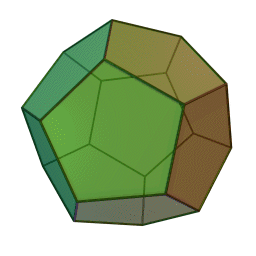 So I found myself thinking about the idea of a game designed explicitly to use the d12, and one idea jumped right out at me. Imagine a game in which your characters played the followers of Pythagoras.
So I found myself thinking about the idea of a game designed explicitly to use the d12, and one idea jumped right out at me. Imagine a game in which your characters played the followers of Pythagoras.He and his followers believed the five Platonic solids, which roleplayers know as the d4, d6, d8, d12, and d20 (the d10 is not a true Platonic solid since its sides are not regular polygons), were associated with the four elements and thus reflective of a fundamental connection between geometry and the structure of the universe. But wait, there's five Platonic solids and only four elements. How does that match up?
The tetrahedron (d4) was fire, the cube (d6) was earth, the octahedron (d8) was air, and the icosahedron (d20) was water, but what about the dodecahedron (d12)? It didn't seem to fit. (One could make a case that the real odd man out should be the tetrahedron. The d6 and d8 are "opposites": connect the centers of the faces of either one to get the other. The d12 and d20 are opposites in the same way. But the d4 is its own opposite. Still, this didn't occur to the Pythagoreans, or if it did, they didn't make much out of it.)
 They concluded the dodecahedron was the mysterious fifth element, or "quintessence" (which literally means "fifth element"), of which the stars themselves were made. At various times the fifth element is associated with spirit, with the forces of creation, and with other mystical concepts, and is never very well defined. Most importantly, the Pythagoreans concluded that the existence of the dodecahedron needed to be kept secret from the rest of the world. Only the elite priesthood of mathematicians could be trusted with the knowledge of the dodecahedron and the fifth element. (They treated the square root of two, and the proof of its irrationality, the same way.)
They concluded the dodecahedron was the mysterious fifth element, or "quintessence" (which literally means "fifth element"), of which the stars themselves were made. At various times the fifth element is associated with spirit, with the forces of creation, and with other mystical concepts, and is never very well defined. Most importantly, the Pythagoreans concluded that the existence of the dodecahedron needed to be kept secret from the rest of the world. Only the elite priesthood of mathematicians could be trusted with the knowledge of the dodecahedron and the fifth element. (They treated the square root of two, and the proof of its irrationality, the same way.)So imagine a game in which they're right: the Platonic solids really are the underlying truth of creation, and the mystical powers of the dodecahedron are too great a secret to be entrusted to anyone. As the sole keepers of the secret, the Pythagoreans -- the player characters -- wield the power of creation (which means they alone get to roll d12s in the game). Everyone else is limited to only the main four elements (and their corresponding dice). Their mission is to ensure it stays that way: to find and quell any opportunity for the secrets of creation to fall into the hands of those incapable of using them responsibly. The unwashed masses who don't understand pure mathematics, in whose hands such forces would inevitably lead to destruction and chaos, no matter their intentions.
It's pretty goofy, and the gimmick feels gimmicky, and those unfamiliar with the history of geometry might find it uncompelling (a joke you have to explain is no joke at all); but I think it could be made to work. If I just had some time with nothing better to do than flesh it out.

 RealTime and RTC
RealTime and RTC Prism
Prism Uncreated
Uncreated Bloodweavers
Bloodweavers Foulspawner's Legacy
Foulspawner's Legacy Lusternia
Lusternia
1 comment:
Their mission is to ensure it stays that way: to find and quell any opportunity for the secrets of creation to fall into the hands of those incapable of using them responsibly. The unwashed masses who don't understand pure mathematics, in whose hands such forces would inevitably lead to destruction and chaos, no matter their intentions.
A game using this conceit would need two things. First, the ability of non-d12 users to attain that level of power or ability -- maybe through learning and texts; geometric proofs as mythos tomes, maybe?
Second, actual factual consequences of the misuse of dodecahedron power, like maybe the diminishing of its efficacy or a weakening of the other four elements that make up the world as they're overtaken by the more potent energies of the higher form.
Post a Comment